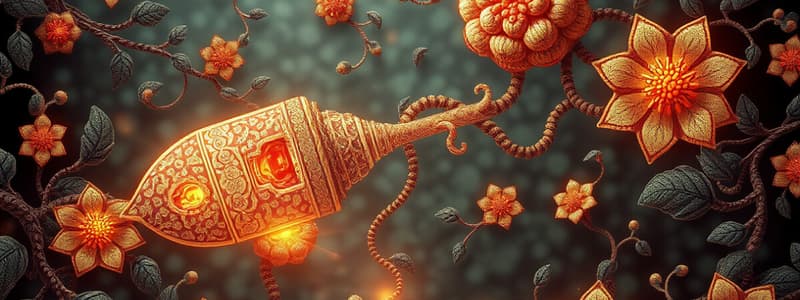Podcast
Questions and Answers
What characterizes hypoglycemia?
What characterizes hypoglycemia?
- High blood glucose and increased glucagon
- Low blood glucose and adrenergic symptoms (correct)
- Decreased insulin and increased TAG synthesis
- High blood glucose and neuroglycopenic symptoms
Which hormones are released during insulin-induced hypoglycemia?
Which hormones are released during insulin-induced hypoglycemia?
- Insulin and somatostatin
- Epinephrine and growth hormone
- Cortisol and thyroid hormones
- Glucagon and adrenaline (correct)
During the absorptive state, what happens to plasma glucose levels?
During the absorptive state, what happens to plasma glucose levels?
- They remain constant and low
- They transiently increase (correct)
- They are completely eliminated
- They decrease drastically
What is the primary role of insulin during the absorptive state?
What is the primary role of insulin during the absorptive state?
How does the liver respond during the absorptive state?
How does the liver respond during the absorptive state?
What factors control the flow of intermediates through metabolic pathways?
What factors control the flow of intermediates through metabolic pathways?
What role does adipose tissue play during the absorptive state?
What role does adipose tissue play during the absorptive state?
Which statement accurately describes the selectivity of the brain during the fed state?
Which statement accurately describes the selectivity of the brain during the fed state?
What is the metabolic state that follows the absorptive state?
What is the metabolic state that follows the absorptive state?
What happens to insulin secretion when plasma levels of glucose fall?
What happens to insulin secretion when plasma levels of glucose fall?
Flashcards are hidden until you start studying
Study Notes
Hormonal Regulation of Energy Metabolism
- Hormones regulate energy storage and mobilization in response to food availability and physiological stress.
- Insulin, produced by beta cells in the pancreas, is a peptide hormone that facilitates glucose uptake and promotes anabolic processes.
- Blood glucose levels stimulate insulin secretion; stress hormones (catecholamines) inhibit it.
- Key actions of insulin include:
- Increasing glucose uptake by muscle and adipose tissues
- Promoting glycogen, protein, and triacylglycerol synthesis
- Mediated through binding to tyrosine kinase receptors, activating insulin receptor substrate proteins.
Glucagon and Counterregulatory Hormones
- Glucagon, produced by alpha cells in the pancreas, opposes insulin's actions and raises blood glucose levels.
- Secretion of glucagon is triggered by:
- Low blood glucose
- Certain amino acids
- Catecholamines
- Elevated glucose and insulin levels inhibit glucagon release.
- Glucagon activates adenylyl cyclase through high-affinity receptors in hepatocytes, producing cAMP and regulating metabolic enzymes.
Metabolic State Changes
- During fasting, a catabolic state occurs due to decreased insulin and increased counterregulatory hormones.
- Priorities during fasting:
- Maintain blood glucose for brain energy needs
- Mobilize fatty acids and produce ketone bodies for other tissues
- Liver converts substrates for gluconeogenesis and ketogenesis, while adipose tissue provides fatty acids and glycerol.
Muscle and Brain Energy Utilization
- Muscle can utilize fatty acids and ketone bodies, and muscle protein may degrade to supply amino acids for gluconeogenesis, which decreases with rising ketone body levels.
- The brain can utilize both glucose and ketone bodies for energy.
- Kidneys synthesize glucose and handle ammonium excretion in prolonged fasting and starvation.
Male Reproductive System Overview
- Male puberty is regulated by increased steroid hormones from gonads and adrenal glands, affecting genitalia development, body hair, and voice changes.
- Key features of the male genital system include the urethral routes through the prostate, pelvic muscles, and penis.
Hypoglycemia and Metabolic Pathways
- Hypoglycemia presents with low blood glucose and symptoms resolved quickly by glucose administration.
- Insulin-induced and fasting hypoglycemia lead to glucagon and adrenaline release.
- The feed-fast cycle regulates metabolic flows through:
- Substrate availability
- Enzyme activation/inhibition
- Covalent enzyme modification
- Induction/repression of enzyme synthesis
- In the absorptive state (2-4 hours post-meal):
- Nutrients are stored as glycogen, TAG, and protein.
- Elevated plasma glucose and TAG levels trigger insulin release and inhibit glucagon.
- This anabolic state allows tissues to use glucose and replenish liver glycogen, proteins, and TAGs.
Brain Nutrition in Different States
- In the fed state, the brain relies exclusively on glucose for fuel.
- Absence of food leads to declining plasma levels of glucose, amino acids, and TAGs, prompting decreased insulin and increased glucagon and epinephrine secretion.
Studying That Suits You
Use AI to generate personalized quizzes and flashcards to suit your learning preferences.




